- Home
- Madeleine L'engle
A Severed Wasp Page 2
A Severed Wasp Read online
Page 2
“Allie?”
“Alwood Undercroft. The sixteenth Bishop of New York; I was fifteenth. I’m still moderately useful in my modest way, and being allowed to remain useful is a great and uncommon privilege. The government ups its retirement age, and the church lowers its, and out you go, arse over amice, whether you’re still in your prime or not. I’m long past my prime, but I wasn’t at retirement, and I’d die quickly if I was just turned out to pasture.”
She shifted the strap of her handbag from one shoulder to the other. She had not got over the habit of carrying music manuscript around with her. “Artists have no mandatory retirement age. I’m not at all sure what I’m going to do with my retirement.”
“You’ll play the piano, of course. Anyhow, aging isn’t done according to strict rules. One of our bishops is in his fifties and looks like Fu Manchu at ninety. He had one of those weird pneumonias a couple of years ago and he’s gone down steadily ever since. Anyhow, I’m enormously grateful to the present Bishop of New York, and I try to be as inconspicuous as possible and not get in the way.”
All about them was the scent of freshly cut grass, of spring bulbs: hyacinth, daffodil, narcissus. Her ears enjoyed the shifting of leaves in the breeze, the gentle twittering of birds. Across this oasis of peace came the peacock’s scream, and a large bird stepped out from the shadows of some rhododendron bushes and crossed in front of them, screaming again, something which sounded extremely rude, then spread its magnificent tail, quivering with iridescent color, and strutted onto the lawn.
Felix applauded. “I’m glad he showed off for you, though they aren’t beasts one can get fond of.”
The door of Cathedral House opened, a handsome door of glass and ironwork, clanging shut heavily, and a tall, dark-skinned man emerged, dressed in a light grey suit and clerical collar. Perhaps clerical collars were more worn in America than in Europe. Or perhaps it was an Episcopalian affectation.
He waved. Felix waved back, then beckoned. “Dean Davidson—”
The tall man paused, shifting a briefcase from one hand to the other. “Bishop. Good to see you.” His voice was warm and deep. A cello.
Felix gestured dramatically toward Katherine. “I want you to meet an old friend of mine from the days of my youth, Katherine Forrester, as she was then, Madame Katherine Vigneras, as she is known now.”
The dean’s face lightened with a quick, open smile. He set down his briefcase and took her hand in his. “This is indeed a great pleasure. I’m one of your many admirers, and we have, I think, nearly all your recordings.”
“The dean plays the English horn,” Felix said. “I’m hoping Madame Vigneras will agree to give at least one benefit concert for us. I’m trying to tempt her with our Bösendorfer.”
That was unfair. “It is not a good thing for an artist to go on for too long.”
Again the dean gave her his brilliant smile. “Don’t let the bishop bully you. For all his quiet ways, he’s a great bully.”
“How can you say that, Dave?” Felix sounded wounded, although he continued to smile. “I must now feed Katherine—Madame—or she will, she has told me, faint from starvation. Oh—” He put one hand lightly on the dean’s. “Here come the Undercrofts! How fortuitous!” He hailed them delightedly. “Bishop! Mrs. Undercroft!”
The couple coming toward them were strikingly handsome, the man fair and fine-featured, the woman tall and dark, with an exotic air. But it was the man who made her reach for Felix’s arm as though giddy. His resemblance to someone she had known almost as long ago as Felix, a German officer in Paris during the Occupation, who had been in charge of the makeshift prison in which she had been interned—the resemblance was startling. Lukas von Hilpert had had grey eyes, and the young bishop’s were a bright, light blue. Otherwise, he was so like him he could have been his son. In fact, the bishop seemed somewhere near the age that von Hilpert had been when she was in his prison.
The woman beside him was tall, unusually tall even in this day of tall women, and beautifully proportioned. Her features were strong and Latin, and her eyes were so dark a brown that it was difficult to tell the pupil from the iris.
Bishop Undercroft greeted Felix with pleasure. “What are you doing wandering around at this time of evening?”
Felix stretched out his arms in an embracing gesture. “Bishop and Mrs. Undercroft, I want you to meet an old and very dear friend, Madame Katherine Vigneras.”
The younger bishop’s reaction was as swift and appreciative as the dean’s. “Madame Vigneras! What an unexpected and lovely pleasure! I met Felix many years ago at one of your concerts—you were playing in San Francisco—so you were, in a way, the cause of what has been a lifelong friendship.” He took her hands in both of his.
“Allie was very young,” Felix said tolerantly.
“But I had good taste—in music, and in choosing friends—didn’t I?” He dropped Katherine’s hand and deferred to his wife, calling her name lovingly. “Yolande?” She smiled at him, nodding, and then turned the smile to Katherine, a warm smile, but behind it, Katherine felt, there was something sad, something unresolved.
“I don’t want to pressure Katherine,” Felix said, “but I am hoping that she will give a benefit concert for us.”
“You are pressuring me, Felix.” She glanced once more at Undercroft; the memories he awoke in her were far more painful than anything Felix could evoke.
“I’m so sorry, my dear.” Felix took her arm in a proprietary gesture. “You don’t have to give us your answer tonight, of course. And now I really must take you home and give you something to eat, mustn’t I?” He slipped into a perfected ritual of farewells, then led her down the steps and turned west, past Diocesan House. As they neared another stone building, he gestured, “This is Synod Hall. The bishops’ offices are here, and it’s here that we hold Diocesan Convention.” She did not know what Synod Hall was, nor Diocesan Convention. She remembered vaguely that Felix was wont to give long answers to simple questions. So she said, “The flowers are beautiful.”
“Lovely, aren’t they? Especially after some of the odors on Amsterdam Avenue.”
They came to a gate in the fence which surrounded the grounds. Felix again shook his key ring until he found the key he wanted, and as he was opening the gate, two little girls in plaid school jumpers came hurrying up, one brightly pretty, with fair, curly hair and heartrending violet eyes, the other a little older, a little too fat, with brown hair strained torturously back from her face in braids which seemed to stretch her skin.
“Oh, good, Uncle Bishop,” the fair child called out. “You can let us in. I left my gate key at home. Thanks.” She made a slight, graceful curtsy in Katherine’s direction, and then caught the other child’s hand, saying, “C’mon, Fatty, we’ll be late and Mrs. Undercroft doesn’t like that.”
Felix clanged the gate behind them, explaining, “The pretty one is Tory, the dean’s youngest. The other’s her odd friend, whose name is actually Fatima.”
“Poor thing. The nickname becomes obvious.”
“She ought to lose some of that puppy fat soon, or she’s in for trouble. She’s lucky to have someone like Tory on her side. Come. That’s my building across the street, just east of that Con Ed monstrosity.” He looked at the light, which was redly flickering DON’T WALK. His voice became petulant. “There’s no safe way to cross 110th. Even with the green light saying WALK, cars can swing round at you. Every few years someone is hurt or killed, and they change the lights for a month, and you begin to relax, and then they change them back, with no thought for the pedestrian. Hurry. Even when the cars don’t come at you, the light barely stays green long enough for you to cross unless you race.” He broke into a bobbling trot, which slowed down, rather than speeded up, his progress.
Katherine remembered that Julie had said, a good many years ago, ‘Don’t bobble, Maman. You waste your energy going up and down instead of going forward.’ She continued to walk calmly beside Felix.
2
<
br /> When they reached the sidewalk, he was panting, and pulled a linen handkerchief from a capacious pocket and patted his upper lip and brow. “I freeze in winter and melt in summer. It’s part of growing old.”—It was not that hot, she thought. Felix had overexerted himself simply crossing the street. “It’s reasonably cool in the apartment,” he reassured. They went in through glass doors to a vestibule filled with a formidable array of names and numbers. Felix followed her glance. “What you do is find the name of the person you’re trying to visit, the apartment number, and then press the button and wait for a voice to come out of that round grille, and then you identify yourself, and your host buzzes that buzzer and the door unlatches, and you can go in.” He waved through the closed doors at a uniformed guard sitting at a desk. The man rose, patting the gun conspicuous in his holster, and let them in.
“Evening, Bishop.”
“Evening, Pio. This is my friend, Madame Vigneras.”
“Buenas noches,” the guard said to Katherine, who returned his greeting. Then Felix led her down a long hall to a bank of elevators.
Even in most of the best hotels in Europe, there were now self-service elevators. She had never learned to be comfortable with them, and she was glad that Felix was with her. One of the doors opened and unloaded a motley assortment of people, white, black, yellow, and in between, speaking Spanish, German, English, and a few other languages she did not understand. Felix put his arm about her to keep her from being bumped, then guided her into the elevator.
“I’m on the twentieth floor, so it’s moderately quiet, and I have a pleasant view.”
The elevator rose swiftly, and the door opened onto a long corridor painted institutional green. He led her past several doors and then opened one with yet another key and took her into an apartment which was cool and unexpectedly beautiful.
Felix urged her into a comfortable chair. “I’ll be with you in just a moment. There are only one or two last-minute things to do.”
She felt weary and irritable. She scarcely smiled when Felix put into her hand a chilled glass of pale, very dry sherry.
Why had she come? Loneliness makes people do strange things, she supposed. Loneliness and curiosity. The old Felix had given no hint that one day he might become a bishop. She had met him in the Village one night, after the theatre, and their first conversation had occurred when she was left alone with him in a rather scruffy apartment on Bank Street, while the young man she had thought to marry had gone off to buy beer with the young woman who was to take him from her.
‘Shall I tell you about myself?’ Felix had asked. Long and pallid, he had sat hunched on a yellow wooden cube, holding his nose between two fingers. A lock of drab, blondish hair fell across his forehead and over one eye. ‘I’m a window cleaner.’ He let his nose go and straightened his bow tie.
She had been informed by the young woman that Felix was a superb violinist. ‘A window cleaner and a violinist?’ she had asked as he paused expectantly.
‘No and. Music is my window cleaning.’ And he had gone on, with unexpected passion for one who seemed so languorously wan, to talk about the human isolation ‘in this fragile bag of bones, where all our windows have been so fouled with futility and folly that we can’t see out. So there have to be window cleaners.’ Artists, he said, would clean the muddied windows with the purity of their art. He was naïve, self-centered, rather pompous. Nevertheless, under the shallow surface of his words there were depths which she, too, believed. Still believed. And so, when she had realized who was behind the voice on the other end of the phone, she had said, “Window cleaner!”
Perhaps in a way he was a window cleaner now, still isolated in his fragile bag of bones. But real.
In the dingy, pseudo-Swedish-modern studio on Bank Street he had gone on talking about himself. Katherine, unused to this kind of immediate self-revelation, did not reply, but sat there looking at this soft young man who belonged to a world so different from hers it might have been another planet. And yet, when he talked about music, it was in a language she could understand.
But then he shifted, waving his long fingers, which were much too tapered and delicate for a piano but might be all right for a violin. ‘I’m not in the least in love with Sarah. Nor she with me. But it might be convenient for us to marry. She has enough money to support me in the manner to which I would like to become accustomed, and we get on very well.’
That was Felix, a combination of idealism and pragmatism, the pragmatism, at least back then, winning over the idealism. But perhaps he had become a window cleaner after a fashion.
Now, in his apartment across from the Cathedral Close, he puttered about, bringing things in from the kitchen. An oval rosewood table was placed in readiness in front of a window which looked east across the city to the river. He set out silver dishes of food, opened a bottle of wine. His living room was small but uncluttered and everything in it was beautiful.
When he was satisfied with the table, he sat on a small stool at her feet (reminiscent of the pose on the yellow cube) and raised his glass of sherry. “To the renewal of a friendship I bitterly regretted losing.”
—Why, then, has he waited so long before trying to renew it? How much has he changed? How far have I come from the naïve adolescent unprepared for love or pain?
She noticed that his fingers were moving rhythmically over the chain of wooden beads. “Is that a rosary?”
His fingers paused. “Not exactly, though occasionally I use it as one. They’re Russian prayer beads, given me by an old Orthodox priest, so they have been well prayed with. I don’t suppose you use a rosary?”
He sounded, she thought, hopeful. She shook her head. “I have one. Also given me by someone I admired and loved—or, rather, they were given me after his death.”
“Who?” he asked with open curiosity.
“You may have heard of him. He was a great friend of Justin’s and mine. Cardinal von Stromberg.”
“But of course I’ve heard of him!” he cried. “I have all his books which have been translated into English. How did you and Justin happen to know him?”
“Wolfi was a lover of music. We were very fond of him.”
“Katya, dear Katya.” He drained the small crystal glass, rose, and led her to the table. He lit the candles, adjusted a single iris in the bud vase. China and crystal gleamed. He did not pull out her chair for her, but stood at his own place opposite her. She started to sit, then realized that he was in the process of saying grace. “Benedictus, benedicam. Amen.” He crossed himself and sat.
The food was superbly prepared and she was hungry.
He watched her eating and smiled, slightly smugly. “I always thought I’d be a good cook, given a chance. Katya, why didn’t you keep your maiden name professionally? Why are you Vigneras instead of Forrester?”
She took a sip of wine, which was dry enough for her definite taste; Justin had taught her about wines. “Forrester was my mother’s name, and I spent a good bit of my life in her shadow. Forrester meant Julie Forrester, not Katherine.”
He demurred. “Surely not now. You saw how both the dean and the bishop reacted.”
“No, not now, but definitely when I was starting out. My mother made an indelible name for herself in a very short time. Her records are collector’s items, going for enormous prices. They still teach me. And then—my husband wanted me to use his name.”
“I thought he was a pianist himself.”
Her voice was chill. “He was. His career was cut off abruptly, sooner than my mother’s.”
The bishop, ignoring her coldness, leaned across the polished surface of the table. “What happened?”
“The Nazis. Among other things, they broke his hands. They mended well enough for all normal purposes. Not for the piano.” She tried to lighten her voice. “The Second World War is old-hat now. Not many young people have even heard of Hitler. But for those of us who were caught up in it, it has had lasting aftereffects.”
“Yes.�
� He winced slightly, as though in pain. “So your Justin fulfilled himself in you?” He pushed back from the table and padded to the kitchen, which was little more than an alcove off the dining area.
“He was no Svengali.” Again, Katherine’s voice was brusque. “We worked extraordinarily well together. And then he did a great deal of composing.”
“I know.” Felix turned, asking gently, “Do you still miss him very much?”
“I do.”
There was naïve curiosity but no malice as he asked, “Was it the perfect marriage all the articles and interviews would have led the public to believe?”
She laughed. “The press tend to believe that any couple who stay together as long as we did must have a perfect marriage, but there is no such thing. We had some very bad times. But as marriages go, it was, in its own way, good. Very good.” She added simply, “I will always miss him.”
Her memory had stored in it a series of film clips (as it were) for her to take out and look at as needed. A treasured one was of a brief vacation in Chamonix, when they had skied in the morning, and in the afternoon had skated, waltzing to a loudspeaker that poured forth nostalgic dance music. Katherine, always clumsy at sports, staying on the beginners’ slopes in skiing while Justin went off for magnificent jumps and grand slaloms, was unexpectedly graceful on skates, and the waltzing with Justin was sheer joy, as the early night fell between the Alps and the stars came out. It was a glorious kind of intercourse, the two of them moving as one, skating to the accelerating tempo of the music so that it was almost as though they were flying among the stars.
And then, back to earth, to the simple physical pleasure of hot chocolate heaped with whipped cream, and crunchy pastries, served at long tables at the side of the skating rink.
It was good. It was very good.
“Oh, my dear—” Felix came back to the table bearing a silver coffeepot.

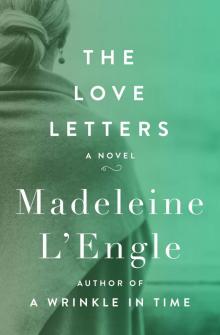 Love Letters
Love Letters The Summer of the Great-Grandmother
The Summer of the Great-Grandmother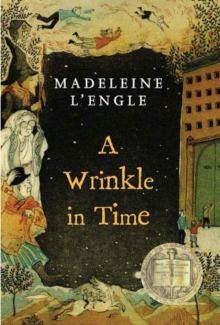 A Wrinkle in Time
A Wrinkle in Time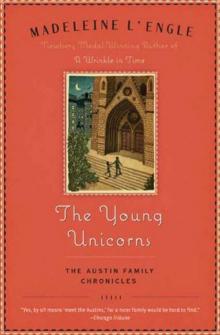 The Young Unicorns
The Young Unicorns Two-Part Invention: The Story of a Marriage
Two-Part Invention: The Story of a Marriage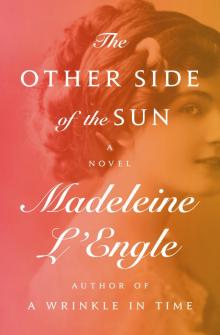 The Other Side of the Sun
The Other Side of the Sun A House Like a Lotus
A House Like a Lotus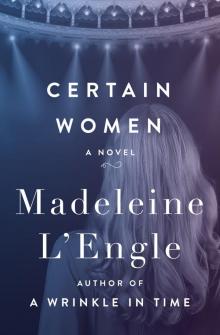 Certain Women
Certain Women Many Waters
Many Waters Camilla
Camilla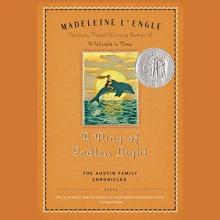 A Ring of Endless Light
A Ring of Endless Light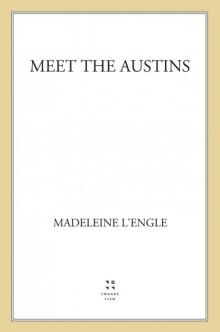 Meet the Austins
Meet the Austins Dragons in the Waters
Dragons in the Waters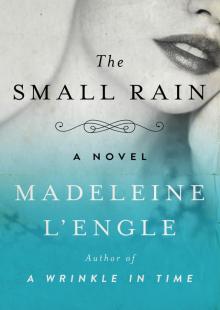 The Small Rain
The Small Rain The Moment of Tenderness
The Moment of Tenderness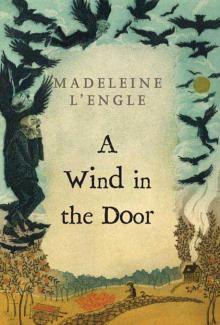 A Wind in the Door
A Wind in the Door Miracle on 10th Street
Miracle on 10th Street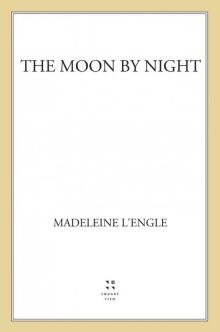 The Moon by Night
The Moon by Night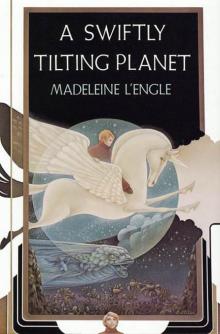 A Swiftly Tilting Planet
A Swiftly Tilting Planet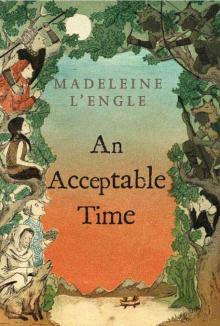 An Acceptable Time
An Acceptable Time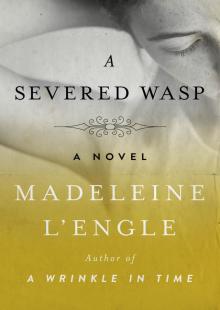 A Severed Wasp
A Severed Wasp The Irrational Season
The Irrational Season A Circle of Quiet
A Circle of Quiet A Live Coal in the Sea
A Live Coal in the Sea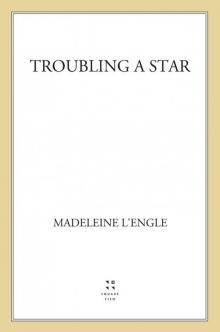 Troubling a Star
Troubling a Star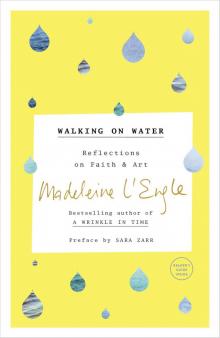 Walking on Water: Reflections on Faith and Art
Walking on Water: Reflections on Faith and Art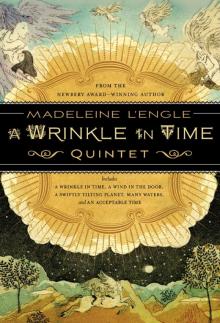 A Wrinkle in Time Quintet
A Wrinkle in Time Quintet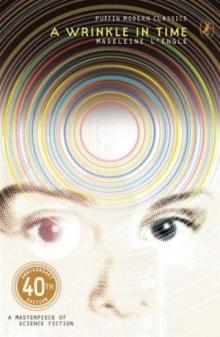 Wrinkle in Time
Wrinkle in Time The Wrinkle in Time Quintet
The Wrinkle in Time Quintet Intergalactic P.S. 3
Intergalactic P.S. 3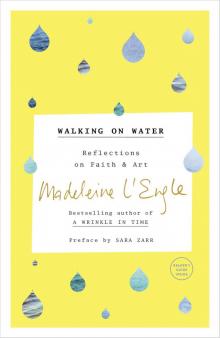 Walking on Water
Walking on Water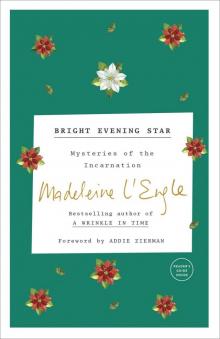 Bright Evening Star
Bright Evening Star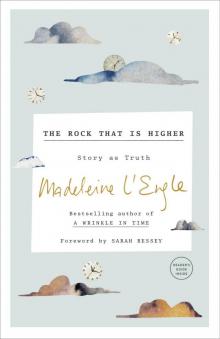 The Rock That Is Higher
The Rock That Is Higher Madeleine L'Engle Herself
Madeleine L'Engle Herself The Arm of the Starfish
The Arm of the Starfish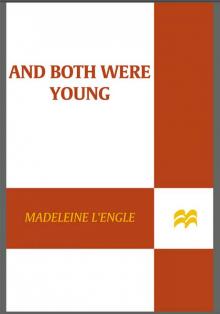 And Both Were Young
And Both Were Young The Twenty-four Days Before Christmas
The Twenty-four Days Before Christmas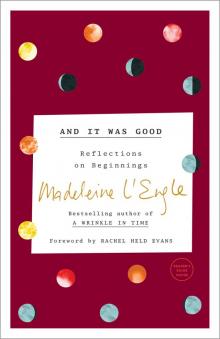 And It Was Good
And It Was Good A Stone for a Pillow
A Stone for a Pillow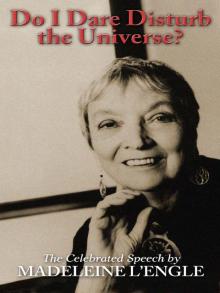 Do I Dare Disturb the Universe?
Do I Dare Disturb the Universe?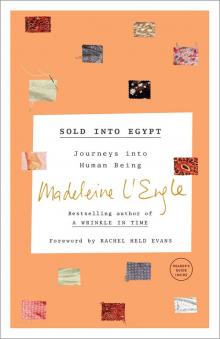 Sold into Egypt
Sold into Egypt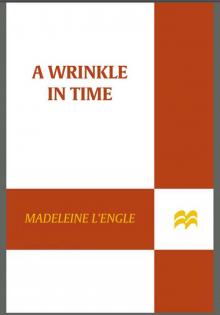 A Wrinkle in Time (Madeleine L'Engle's Time Quintet)
A Wrinkle in Time (Madeleine L'Engle's Time Quintet)